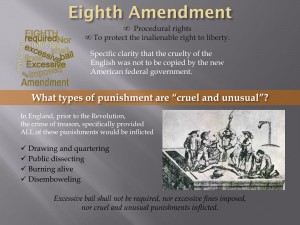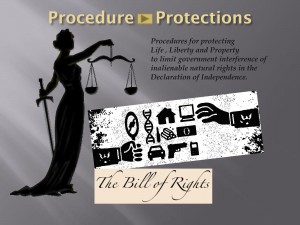 When reflecting on the first ten amendments to the American Constitution, or the Bill of Rights, focus is often on the great freedoms of religion, speech, press and the right to bear arms. The Bill of Rights became 225 years old on December 15, 2016. With that in mind, it is worth a moment to reflect upon other amendments, particularly the Fourth, Fifth, Sixth and Eighth. These four amendments contain sixteen of the twenty-four rights enumerated in the Bill of Rights. You can learn how the Bill of Rights came to be in: The 225th Anniversary of the Bill of Rights, Part I.
When reflecting on the first ten amendments to the American Constitution, or the Bill of Rights, focus is often on the great freedoms of religion, speech, press and the right to bear arms. The Bill of Rights became 225 years old on December 15, 2016. With that in mind, it is worth a moment to reflect upon other amendments, particularly the Fourth, Fifth, Sixth and Eighth. These four amendments contain sixteen of the twenty-four rights enumerated in the Bill of Rights. You can learn how the Bill of Rights came to be in: The 225th Anniversary of the Bill of Rights, Part I.
These amendments contain two-thirds of the rights found in the Bill and consist of “procedural rights” meant to impose upon government specific conduct when it seeks to interfere with the great unalienable rights found in the other amendments. The following is an overview of these important procedural rights.
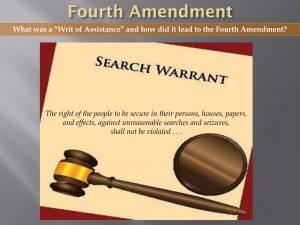 The right of the people to be secure in their persons, houses, papers, and effects, against unreasonable searches and seizures, shall not be violated, and no warrants shall issue, but upon probable cause, supported by oath or affirmation, and particularly describing the place to be searched, and the persons or things to be seized.
The right of the people to be secure in their persons, houses, papers, and effects, against unreasonable searches and seizures, shall not be violated, and no warrants shall issue, but upon probable cause, supported by oath or affirmation, and particularly describing the place to be searched, and the persons or things to be seized.
How did “Writs of Assistance” lead to the Fourth Amendment?
A “writ of assistance” was a particular type of “general warrant” used by the British to search colonial property before the Revolution. The Fourth Amendment responded to King George’s “general warrants” which did not respect the sanctity of private property. The Fourth Amendment, like the Third Amendment, is rooted in the English tradition of the sanctity of one’s home.
The king’s “general warrants” did not define a place to be searched or items sought. A king’s agent with a general warrant had almost unrestricted power to search anywhere.
In 1760 property belonging to Boston merchants were the main targets of “writs of assistance” searches. They resisted the writs in colonial courtrooms and lost. The cases set in motion events that lead not just to the Fourth Amendment, but to the American Revolution.
The lessons Americans learned from Britain’s misuse of general warrants resulted in the Fourth Amendment’s ban on “general warrants” by requiring probable cause and details of the location to be searched and person or items to be seized.
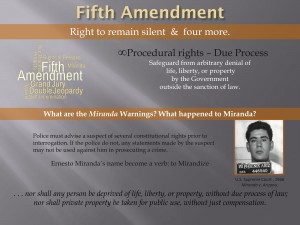 The Fifth Amendment: The Right to Remain Silent and Four More
The Fifth Amendment: The Right to Remain Silent and Four More
No person shall be held to answer for a capital, or otherwise infamous crime, unless on a presentment or indictment of a grand jury, except in cases arising in the land or naval forces, or in the militia, when in actual service in time of war or public danger; nor shall any person be subject for the same offense to be twice put in jeopardy of life or limb; nor shall be compelled in any criminal case to be a witness against himself, nor be deprived of life, liberty, or property, without due process of law; nor shall private property be taken for public use, without just compensation.
How many rights are in the Fifth Amendment and what are they? The Fifth Amendment contains five procedural rights. People are entitled to the benefits of these constitutional procedures as protections for their inalienable rights.
The Fifth Amendment’s protections for life, liberty and property exist to limit the government’s interference with the inalienable natural rights of the Declaration of Independence.
What are the Miranda Warnings and what happened to Miranda?
The Miranda warnings are part of American criminal justice and American popular culture. These Warnings combine elements of the Fifth and Sixth Amendments, the right to remain silent and the right to counsel.
Ernesto Miranda was the name of a twenty-three-year-old Mexican immigrant, who was arrested and convicted of a serious crime after being questioned in police custody for over four hours. His 1966 case, Miranda v. Arizona, resulted in the United States Supreme Court requiring that police must advise a suspect of his constitutional rights prior to interrogation, because it was impossible for a suspect to exercise his rights if he does not know them. Since then, if the police do not advise a suspect of his rights, any statements made by the suspect may not be used against him in prosecuting a crime.
It is from this case we get the term “Miranda Warnings.” Ernesto Miranda’s name has even become a verb: to Mirandize. The standard warnings are:
You have the right to remain silent. Anything you say can and will be used against you in a court of law. You have the right to have an attorney present during questioning. If you cannot afford an attorney, one will be appointed for you.
A footnote to the story: In 1976 Miranda was killed in a Phoenix bar. A suspect was arrested in his killing. The suspect was advised of his right to remain silent and did so. No one was ever convicted in the killing of Ernesto Miranda.
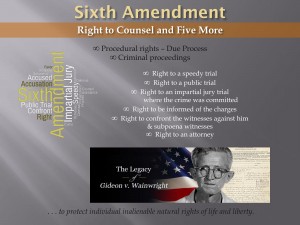 The Sixth Amendment: Right to Counsel and Five More
The Sixth Amendment: Right to Counsel and Five More
In all criminal prosecutions, the accused shall enjoy the right to a speedy and public trial, by an impartial jury of the state and district wherein the crime shall have been committed, which district shall have been previously ascertained by law, and to be informed of the nature and cause of the accusation; to be confronted with the witnesses against him; to have compulsory process for obtaining witnesses in his favor, and to have the assistance of counsel for his defense.
How many rights are in the Sixth Amendment and what are they? The Sixth Amendment contains rights beyond the well-known right to an attorney in criminal matters. There are six constitutional rights in the Sixth Amendment. They are procedural rights designed to protect an individual’s inalienable natural rights of life and liberty. A summary of Sixth Amendment rights:
- Right to a speedy trial
- Right to a public trial
- Right to an impartial jury trial in the place where the crime was committed
- Right to be informed of the charges
- Right to confront the witnesses against him and to subpoena witnesses
- Right to an attorney
Does the right to counsel now apply to all criminal defendants?
Thanks to the 1963 case of Gideon v. Wainwright, if a criminal defendant faces the possibility of six months or more in jail, he is entitled to a court appointed attorney, without cost if he cannot afford one.
Clarence Gideon was charged with having burglarized a poolroom. Gideon appeared in court indigent and without a lawyer. He asked the court to appoint counsel for him. His request was denied. Gideon was found guilty and sentenced to five years in prison.
From the Florida State Prison a pencil written appeal of Gideon’s conviction was sent to the US Supreme Court. The handwritten appeal argued that Gideon had been denied his Sixth Amendment right to appointed counsel.
The Supreme Court overturned Gideon’s conviction. In doing so, the Court said that the Sixth Amendment right to counsel applied to all state criminal prosecutions, and that the states were obligated to appoint counsel for indigent defendants. Gideon was given a new trial and a court appointed attorney. The jury found him not guilty in less than an hour.
Excessive bail shall not be required, nor excessive fines imposed, nor cruel and unusual punishments inflicted.
What is the history and purpose of the Eighth Amendment?
The Eighth Amendment is an additional group of “procedural” rights designed to protect a citizen’s inalienable rights. It requires the government to follow specific rules if it attempts to interfere with liberty.
In 1641, The Massachusetts Bay Colony adopted a Body of Liberties with a right to bail and prohibiting cruel and inhuman punishments. The Eighth Amendment’s language is virtually identical to the 1776 Virginia Declaration of Rights. The 1776 Virginia provision was:
That excessive bail ought not to be required, nor excessive fines imposed, nor cruel and unusual punishments inflicted.
This is an example of how important the colonial experience was in shaping the Bill of Rights.
A defendant’s pre-trial detention is affected by the excessive bail clause, and exists because of the importance placed upon the idea of liberty
What types of punishment are “cruel and unusual”?
Some punishments are forbidden entirely by the Cruel and Unusual
Punishments Clause. Over time the Supreme Court has provided examples of punishment are clearly cruel and unusual:
- Drawing and quartering
- Public dissecting
- Burning alive
- Disemboweling
Many of these had been punishments for crimes in England prior to the Revolution. The crime of treason in England specifically provided that each one of the above punishments would be inflicted. The Eighth Amendment made clear that the cruelty of the English was not to be copied by the new American federal government.
Given the great power of government to exercise control over the life, liberty and property of its citizens through the criminal law, it was critical not just to place restrictions on government interference with the great Natural Rights found in Amendments 1 and 2, but to put in place, constitutional limitations on government when it exercised its authority in the criminal arena. 2/3 of the Bill of Rights is devoted to making certain when government exercises its most invasive power, it does so in a way to ensure the due process of law.
The procedures established in the 4th, 5th, 6th and 8th Amendments are there to protect life, liberty and the pursuit of happiness when the government seeks to take those very rights away.
Watch David Shestokas’ presentation at the Citizens for Liberty Bill of Rights Celebration. This article is an excerpt based upon that presentation.
